|
|
|
Sort Order |
|
|
|
Items / Page
|
|
|
|
|
|
|
| Srl | Item |
| 1 |
ID:
183930
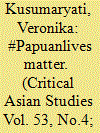

|
|
|
|
|
| Summary/Abstract |
After the brutal killing of George Floyd sparked antiracism protests worldwide, Black youth organized protests in West Papua, Indonesia’s marginalized and easternmost region. In 2019, Papuans protested against entrenched racism in Indonesian society, when Papuan students in Java were subjected to racist epithets. Since then, Papuans have used the hashtag #Papuanlivesmatter to articulate their connection with broader antiracism protests across the world and bring the Papuan experience to #BlackLivesMatter movements. While global Black political movements have long shaped Papuan identities, the new Papuan Lives Matter movement shows how digital media have played an influential role in the spread of antiracism protests and how Blackness has been understood and articulated, not only in relation to white supremacy but also to postcolonial claims of multiculturalism in Asian societies. This article discusses the specific context in which protests under Papuan Lives Matter emerged and its relationship with the global Black Lives Matter movements. This article also explores the idea of Blackness in West Papua that stems not only from the influence of and conversation with American Black political movements and African liberation movements but also lived experience as a Black people under Indonesian occupation.
|
|
|
|
|
|
|
|
|
|
|
|
|
|
|
|
| 2 |
ID:
098936
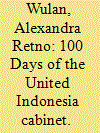

|
|
|
| 3 |
ID:
057160


|
|
|
| 4 |
ID:
129477
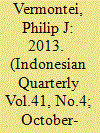

|
|
|
|
|
| Publication |
2013.
|
| Summary/Abstract |
The year 2013 has been seen as a prelude to the so-called political year of 2014. One of the weirdest political scenes in 2013 was when political parties had to advertise in the media in order to find people to
be listed as their candidates for the parliamentary election. Moreover, the parties had to rush in recruiting the candidates to meet deadlines for names submission set out by the Indonesian Election Commission KPU). This can be understood as a symptom of how dysfunctional our political parties are. Party recruitment and training program are indicators of whether or not a political party is well-functioning. A political party has to be ready with its recruitment process immediately after an election is done. It has to start all internal political process right away. By doing so, those who lost in the election will be able to quickly regroup while the winner consolidates. But what we saw in such an advertisement in the media simply reinforces the image
widely held by the public that politicians and /or political parties are just regular job seekers. Politicians are no longer thought of as noble individuals. Politics then become an arena which good people do not intend to enter.
|
|
|
|
|
|
|
|
|
|
|
|
|
|
|
|
| 5 |
ID:
132039
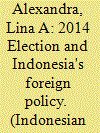

|
|
|
| 6 |
ID:
069939
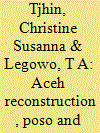

|
|
|
| 7 |
ID:
113390
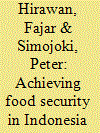

|
|
|
| 8 |
ID:
120249


|
|
|
|
|
| Publication |
Singapore, ISEAS, 2012.
|
| Description |
xvii,347p.pbk
|
| Standard Number |
9789814379649
|
|
|
|
|
|
|
|
|
|
|
|
Copies: C:1/I:0,R:0,Q:0
Circulation
| Accession# | Call# | Current Location | Status | Policy | Location |
| 057274 | 337.1/DAS 057274 | Main | On Shelf | General | |
|
|
|
|
| 9 |
ID:
113388
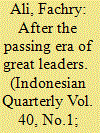

|
|
|
| 10 |
ID:
157939
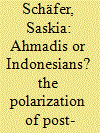

|
|
|
|
|
| Summary/Abstract |
Since the fall of Suharto in 1998, Indonesian public discourse about “mainstream” Muslim identity and practice has polarized sharply into various factions. This article offers a detailed analysis of a subset of this discourse that focuses on the Ahmadiyya in order to grasp how the new normative contours of Islam are being shaped in Indonesia. I make three arguments: First, the discourse is homogenizing what was once a wide spectrum of identitarian positions, and that consequently, Islamic diversity in Indonesia is shrinking. Second, the various internally homogenized sets of arguments for and against the Ahmadiyya mis-engage with each other in a way that produces social fragmentation and further polarization. Third, these arguments produce exclusionary mechanisms that reinforce each other. Both the opponents of the Ahmadiyya and their defenders exclude Ahmadis from conceptions of an Indonesian “majority.” This dynamic in Indonesian public discourse has resulted in the acceleration of the marginalization of the Ahmadiyya within an increasingly fragmented Indonesian society.
|
|
|
|
|
|
|
|
|
|
|
|
|
|
|
|
| 11 |
ID:
140332
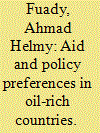

|
|
|
|
|
| Summary/Abstract |
This paper analyses the role of foreign aid in assisting development in two oil-rich countries: Indonesia and Nigeria. It seeks to understand the way foreign aid provided assistance to transform Indonesia from a ‘fragile’ state in the 1960s into one of the ‘Asian Tigers’ in the mid-1990s, and why it did not prevent Nigeria from falling into ‘African Tragedy’. The paper argues that foreign aid may help not only to finance development, but also to navigate policy makers’ policy choices. It shows how foreign aid may or may not help policy makers turn their policy preferences into action.
|
|
|
|
|
|
|
|
|
|
|
|
|
|
|
|
| 12 |
ID:
132006
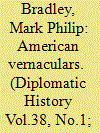

|
|
|
|
|
| Publication |
2014.
|
| Summary/Abstract |
On a wintry January evening in 1973, the members of Amnesty International USA Group 11 gathered on the Upper East Side of New York City to adopt a new prisoner of conscience, Sutanti Adit of Indonesia. Adit, a medical doctor and the wife of the leader of the Indonesian Communist Party, had been arrested and imprisoned in the ruthless campaigns of repression that followed a failed 1965 coup against the Sukarno government, which had ruled Indonesia since its formal independence from Dutch colonial control in 1950. She was among more than a hundred thousand Indonesians arrested, interrogated (often under torture), and imprisoned by the state. As many as fifty thousand of them remained in custody for more than a decade housed in prison camps whose sanitation, medical facilities, and food were inadequate at best. They were permitted very limited contact with the outside world, including family and friends, and harshly mistreated by prison guards.1
|
|
|
|
|
|
|
|
|
|
|
|
|
|
|
|
| 13 |
ID:
099937
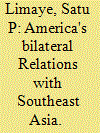

|
|
|
|
|
| Publication |
2010.
|
| Summary/Abstract |
This special issue of Contemporary Southeast Asia examining United States bilateral relations with Myanmar, Cambodia, Indonesia, Laos and Vietnam, and specifically the mutual efforts at "rapprochement", "re-engagement" or "revitalization", is informed by several considerations. First, the Obama administration took office with a declared commitment to improve relations with the Association of Southeast Asian Nations (ASEAN) as an organization and moved with alacrity to implement a number of policy decisions to that end. Second, and in parallel, the administration highlighted opportunities for broader and deeper bilateral relations with specific ASEAN member countries…Together, this focus on Southeast Asia is an important element of the current administration's overall focus on US relations with the Asia Pacific - a focus which represents one of the most significant periods of US regional activism in decades.
|
|
|
|
|
|
|
|
|
|
|
|
|
|
|
|
| 14 |
ID:
138260
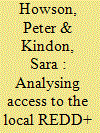

|
|
|
|
|
| Summary/Abstract |
The Reducing Emissions from Deforestation and Forest Degradation (REDD+) project in Sungai Lamandau was Indonesia's first forest carbon finance initiative officially proposed by a community group upon land they intended to control autonomously. However, the flagging carbon market and government licensing obstructions stalled progress towards possible monetary gains. With a focus on the agency of local farmers, we explore the ‘bundles of powers’ that they mobilised to access the other diverse and, at times, elusive set of benefits within the REDD+ project. In the absence of a formal tenure and ‘carbon rights’ regime, local actors' ability to benefit from the project was dependent on social relationships, REDD+ knowledge and access to local markets and capital. The result was a benefit-sharing framework of uneven distribution.
|
|
|
|
|
|
|
|
|
|
|
|
|
|
|
|
| 15 |
ID:
175065
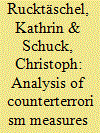

|
|
|
|
|
| Summary/Abstract |
This article analyzes counterterrorism (CT) measures that have been developed and implemented since the 2002 Bali attacks, paying special attention to the presidencies of Yudhoyono and Widodo. On the basis of anti-terrorism concepts, current findings of anti-terrorism research will be applied to the case of Indonesia, whereby we will distinguish between reactive and preventive measures and will show how they interact. Here, the revision of existing anti-terror laws carried out by the Indonesian Parliament in May 2018 will receive particular attention. As will be documented, in spite of the initially quite promising short-term effects of CT measures, the already strained relationship between the police and the military regarding jurisdiction has become even more critical in recent years. Since only a few religious or civil authorities have been included to a large extent in attempts to prevent terrorism, these measures are not likely to be as effective and lasting as they might have been.
|
|
|
|
|
|
|
|
|
|
|
|
|
|
|
|
| 16 |
ID:
176862
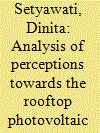

|
|
|
|
|
| Summary/Abstract |
In 2018, the Indonesian government issued the Rooftop Photovoltaic Solar Systems (RPVSS) policy that allows customers of the State Electricity Company (PLN) to generate their own electricity supply from solar photovoltaic (PV) systems and export surplus electricity to the national grid, valued at 65% of the full retail tariff. This policy is an effort to increase renewable energy levels in the national energy mix by 23% by 2025. Customer adoption of PV systems relies on the perceptions and perceived benefits of the technology, as well as general issues of confidence in the product. This paper explores the public's acceptance of the RPVSS policy from multiple perspectives. An online survey of PLN customers (n = 987) indicated consumer issues in adopting PV systems, such as high capital costs, long term return on investment and lack of information, as well as institutional issues such as the limited role of PLN and the absence of government financing mechanisms. Additional interviews with the government, private sector and energy experts identify the export rate for electricity injected into the grid as the main barrier to attracting prospective users. This paper's findings provide useful recommendations for policymakers to successfully implement the policy and increase solar energy deployment.
|
|
|
|
|
|
|
|
|
|
|
|
|
|
|
|
| 17 |
ID:
084034
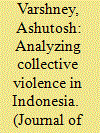

|
|
|
| 18 |
ID:
168785
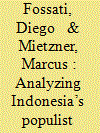

|
|
|
|
|
| Summary/Abstract |
Using original survey data, we test the level, distribution, and demographic patterns of populist attitudes in Indonesia. Populist attitudes are widely spread across the political spectrum; disproportionately high in the middle and upper classes; and particularly robust when coupled with other primary ideologies, such as Islamism and secularism.
|
|
|
|
|
|
|
|
|
|
|
|
|
|
|
|
| 19 |
ID:
065773
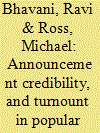

|
|
|
| 20 |
ID:
120026
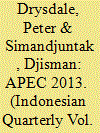

|
|
|
|
|
|
|
|